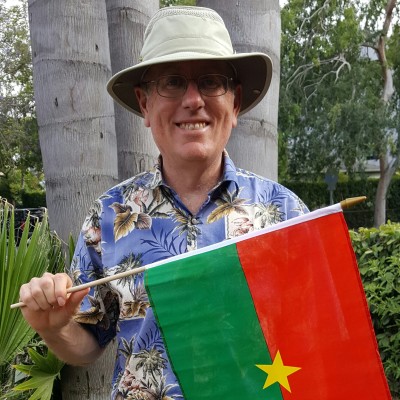Today's my last day in the Peace Corps, before I'm medically seperated (i.e. fired). Some thoughts on Burkina Faso, ZPG, development and the Peace Corps. Finally, a word or two about my medical state and prognosis.
Development, Burkina Faso and the Peace Corps
Back in mid-July, I talked about some of the challenges of working in Burkina Faso. Two days after that, the motorcycle hit me and re-directed my attention elsewhere, but I kept thinking about it. I was frustrated at the time. Succinctly, my central question was why the Burkinabè kept having so many children, when their birthrate, north of 5.5 children/woman, is so clearly suicidal in the medium and long term. No amount of development will keep up with such an astronomical birth rate.
At the time, I knew I was being unfair, but I didn't know exactly how I was being unfair. I wasn't satisfied with one of the standard, façile answers as to why the birth rate was so high, like “because of lack of education.” Yes, education, but that's so broad that it's nearly meaningless: What, specifically, was lacking in the education?
Further: When people in the West say “because of education,” it's almost like saying that people in developing countries are dumb. That doesn't hold up more than five seconds when you're actually living there. My host father, Yacouba, might be illiterate, but he's a smart, kind, caring man. He is very intelligent, responsible, and respected by the community. And he has a ton of kids. Why? I was working myself up to having that conversation with him, when my stay with him was abruptly terminated.
In the Hospital
In the hospital in Ouaga, I had an interesting exchange with two of the doctors. One was talking to the other about how I had known that I shouldn't have been moved until my leg was immobilized. It seemed so obvious to me, but he said to his colleague, “you see, people in developed countries know these things!” He asked me if I knew that from a first aid course when I was a child, and I honestly didn't know. Maybe that, or maybe from watching “Emergency!” on the TV or something. But the point is, this knowledge that seemed so obvious and automatic isn't. I got the distinct impression that these doctors had seen tons of patients whose injuries were made much worse by people moving them, before they were able to immobilize the broken part.
Stepping back a moment, there are a ton of life skills that we learn in the West, because we are developed. We know to wash our hands before eating. We know that you don't move a broken leg. We're at least vaguely aware of the Heimlich Maneuver. In less developed places, people just don't have a way to know these things. And, because of that, they get disfigured. They get diseases. And they die.
OK, so what else did I grow up with?
Koyaanisqatsi
In my formative years, the world's population reached the unimaginable level of four billion. That was in 1974. Worry about overpopulation was a big part of the culture. Heck, in 1969, Captain Kirk taught us all about the horrors of overpopulation in The Mark of Gideon. And who can forget Koyaanisquatsi, Life Out of Balance? I very much grew up with a strong cultural value that having a large family, much in excess of the replacement rate, is selfish and downright irresponsible. Zero Population Growth was a political movement, right alongide feminism, environmentalism and civil rights.
Looking at pop culture like Koyaanisqatsi and Logan's Run and Soylent Green might seem a little trivial, but I'm serious. Movies and TV both form culture, and they reflect it. Concern about overpopulation was a big deal when I was growing up. It still is now, too, though global warming maybe gets more air time these days.
When I was in the US Embassy, and they showed the map of how the percentage of uncultivated arable land in Burkina Faso went from 80% in the 80's to maybe 10% today, it really hit me in the gut. At the time, I mostly just thought I was being rational, but in truth, it hit me especially hard because I spent my childhood with the idea that ZPG is a societal goal, and anything else is immoral and suicidal.
Cutting Burkina Faso Some Slack
Now that I understand how deeply rooted my convictions re: overpopulation are, I find it easier to cut the Burkinabè some slack. They didn't grow up with Captain Kirk and ZPG. Not only that, most folks there don't have the kinds of systems thinking that comes with a fancy computer science degree. Further, Burkina Faso has been exploited pretty thoroughly in the very recent past, and in many ways in the present. That doesn't lend itself to a gaia consciousness of the fragility of our planet, and our global responsibility to be good stewards.
Shortly after I got back to the US, I talked to a cab driver from El Salvador about this. He came from a ginormous family, but he said that today, people there have one or two kids. The reason? Well, he didn't really know, but the fact that kids are so expensive certainly figured into it.
I guess that in Burkina Faso in the 80's and 90's, for families living on subsistance agriculture, it even made economic sense to have a large family, because your family members are your support system. That works great, as long as there's available land to expand on to when the kids grow up. That only started to not be true in Burkina Faso relatively recently. A culture changes slowly – the US didn't go from celebrating large families to Koyaanisqatsi overnight, and neither will Burkina Faso. As a hierarichial, community-based culture, Burkinabè culture is perhaps more resistant to making that change. That said, they have zero available land, malnourished kids and extreme poverty as incentives to move to a more sustainable birth rate, so maybe the transition won't be as slow as all that.
The Role of the Peace Corps
OK, so I think I understand why I was getting frustrated, and I think I understand how I was being unfair. So, what about the role of the Peace Corps? Is it valuable?
Yes.
I think the main benefit might be indirect. I don't care how much tofu you make or how many gardens you plant, the direct development will be swamped by a birthrate north of 5.5 in a nanosecond. But.
By living there, we influence how people think. A village where decades of exploitation has left people feeling disempowered sees a volunteer come in, try five projects, and have one of them work. The project is great, but even better is the example of trying a bunch of things, until one works. It sets an example, and maybe others follow, long after the volunteer is gone.
By living there, we make friends. We tell them about ZPG and Captain Kirk's “gift” to Odona on Gideon. Just by being there, and trying to make the world a little better, we make people think on a more global scale. If I had been able to stay, I would have shared my convictions, and maybe some of my friends or students would have thought a little more about things like family size, and education.
Do the folks there share the Peace Corps' development goals? Probably not 100%. Maybe not even all that much. And that's OK.
As a Junior High School Physics/Chemistry teacher, the primary goal of my colleagues at school would have most likely been to get a free teacher for two years. But that's totally normal. Of Course they wouldn't have been as focused as I would have been on women's education, or prevention of uninteded pregnancy, or longer-term development goals. Most of the parents probably would have mostly cared about their kids getting good grades, good test scores, and maybe learning something. That's normal. I shouldn't expect otherwise.
Even so, by being there, I would have had those other effects. They would have been indirect, and probably hard to see, but they would have been there. I'm firmly convinced of that.
I wish I hadn't been forced to leave so abruptly. If it were possible for me to pick up where I left off, I would. I miss Burkina Faso.
Medical State
I'm making good progress! The bone is healing nicely. I got to take my knee brace off last Tuesday (five days ago). At first, I could maybe bend my knee 70 degrees, but now I'm past 90. I think my ankle flexibility might be up to 90 degrees now, as opposed to 60 degrees when I started physical therapy. I'm still using crutches, but I can stand, and I can almost walk. I think I'll graduate to a cane in about a week, and I should be able to ride a bicycle before too long.


My femoral nerve still doesn't work, so I still suffer from “drop foot.” This means I can't lift my left foot up, and I have major numb areas on my foot and lower leg. I need a prosthesis to walk, and my foot tends to swell up, because several muscle groups aren't working, and it's the flexing of muscles that helps move blood out of your extremities.
I can expect my nerve to be totally out of commission until at least February. If it comes back at all, the process will start around February, and it will slowly get better through early 2019. It's unlikely it will ever be 100%, but the surgeon in Morocco said I could regain maybe 70% of neural function by 2019. The neurologist here in the US gave me a 50/50 chance of regaining any nerve function at all. But, we did an MRI, and it looked OK – it didn't identify any damage we didn't already know about from the surgery in Morocco. For now, all I can do is wait, and see what happens.
In the worst case, I'll have a permanent disability, but I'll be able to walk and bicycle, and live a pretty normal life. In the best case, I'll be a little numb, and maybe have a left foot that's a little wonky. Yes, it sucks, and now that the rest of me is feeling so much better, I notice the drop foot more.
Still, I'll take it. Indeed, given what happened, I consider myself to be lucky. I'll be fine.
Insurance
Oh my. What a pain! As long as I was still in the Peace Corps, they took care of all the medical bills. The system is a little weird, and it confuses the heck out of billing departments, but it worked. Now that I won't be in the PC, I have to file a worker's compensation claim with the Department of Labor. I have to change to a physical therapist who accepts workers comp, and ask them to take it on faith that I'm filing a claim for the ~2 weeks it will take me to get a claim number. For diagnostic services (as opposed to treatment), the Peace Corps apparently pays directly, for the next six months. After that? Search me!
It's all very confusing, and the folks at the Peace Corps do their best, but I very much get the impression that they're understaffed. It's frustrating, time-consuming, and a little scary. That said, I'm grateful that President Woodrow Wilson signed the Federal Employee's Compensation Act into law in 1916, so that I would be covered. Thanks, President Wilson!
What Next?
So, what comes next? Honestly, I don't know. It will be another five months before I start to get an idea as to how much of a permanent disability I'll have. I bought a temporary car. I tried to keep it sober and conservative.


When I'm ready, I'm certainly open to the idea of serving in the Peace Corps again, maybe via Peace Corps Response. A shorter-term engagement seems like a better fit, after the year-ish I'll have given the Peace Corps, once you count all the recuperation. I don't even know if I'd qualify, medically – that might depend on whether or not I recover nerve function.
I still want to do long-distance bicycle touring in Europe. I'm thinking I'll probably spend more time in more developed countries: More France and less Romania, and more hotels and less camping, at least while I'm not 100%. Luckily, the nature of my injury won't hurt my ability to bicycle too much. I probably won't want to clip in as long as I can't lift my left foot, but I can push just fine, so I should be OK. Maybe next spring I'll be able to think seriously about that. In the mean time, I found a cute place to buy a bicycle in France. Maybe I'll buy a bike there, if I can find a place to store it for a decade or two after my big trip. Or maybe a Bike Friday “New World Tourist” with drop bars.

For now, I'm planning to get a short-term rental, for six or nine months. Maybe a little place in Ventura, or maybe West L.A.. I basically need a place to convalesce and go for walks and stuff for a while, but I really don't know what I'll want to do after. Peace Corps Reponse? Bike odyssey in Europe? Something else?

I'm hoping to find some kind of project to work on – maybe I'll even write
some software. I've been playing around with
Kotlin, Android, Heroku,
Postgres
and Go.
A bit to my surprise, I like Go. My first reaction was “CSP and coroutines with a memory-safe C-ish language substrate – trite and derivative!” But the thing is, on massively scalable systems, you do need to avoid blocking on threads. That can be done with futures and stuff, and manually building a big old state machine, but that's tedious and error-prone. Sorry, but it is. Co-routines seem like a good way to basically automate building that state machine, while providing a programming model that is more intuitive, because it feels like traditional declarative programming. Sure, Kotlin can do co-routines too, but the thing is, the Go ecosystem was built from the ground up on the coroutine model. The Kotlin/Java ecosystem, OTOH, is pretty deep into the futures/NIO way of doing things. Mature ecosystems are desperately hard to shift.
So yeah, I still like software :-)
Let me know if you know of an interesting project that I can do part-time from Southern California!

